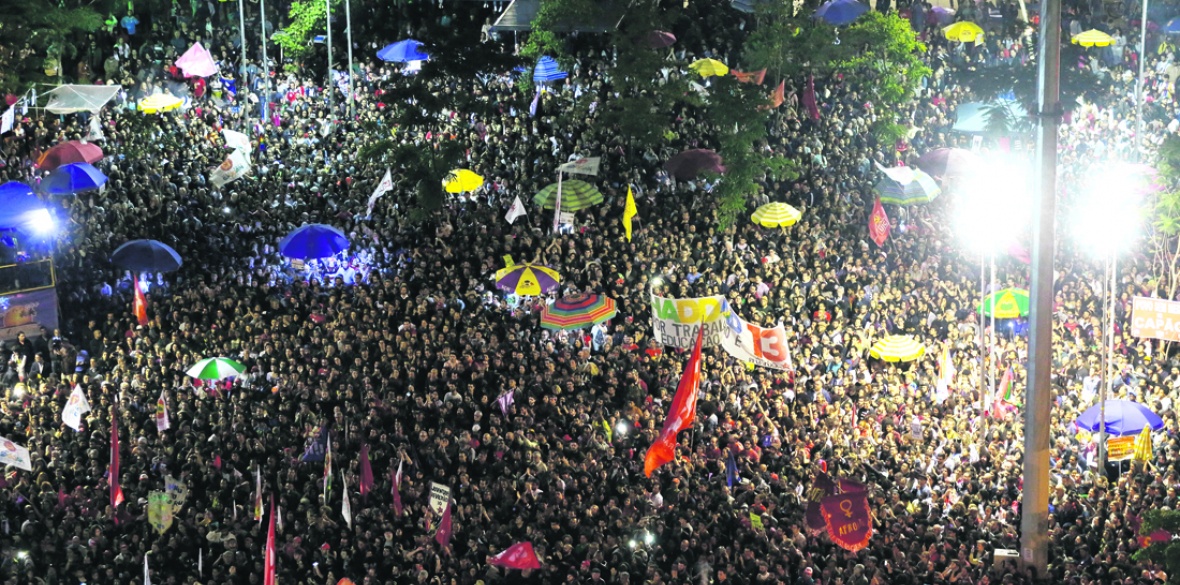This is the last article you can read this month
You can read more article this month
You can read more articles this month
Sorry your limit is up for this month
Reset on:
Please help support the Morning Star by subscribing here
Eyes around the world will be on elections in Brazil, tomorrow, between Jair Bolsonaro of the far right and Fernando Haddad who is the left-wing Workers’ Party (PT) candidate.
Bolsonaro had a commanding lead of more than 16 per cent in the first round.
Alarm bells rang around the world this week when Bolsonaro chillingly said that if he was elected “leftists will have to... leave the country or go to jail,” adding “it will be a clean up, the likes of which has never been seen in Brazilian history,” and that “reds will be banished from the homeland.”
While millions of Brazilians are campaigning flat out to defeat the far right, our comrades there have also warned that whatever the election result even bigger battles lies ahead, and our international solidarity will be vital.
For those not following the election in detail, it is worth recapping some of the other things Bolsonaro has said, and what he stands for, which shows why so many diverse groups in Brazilian society — including women’s campaigners, LGBT groups, BAME communities, trade unions, environmental activists and others — have sounded the alarm at what his victory would mean not only for the future of that vast country, but also the future of Latin America as a whole and indeed the world.
To give some specific examples of his extreme and reactionary agenda many of the mobilisations in Brazil against Bolsonaro have focussed on sexism, citing that in 2014 he had an argument with congresswoman Maria de Rosario he said: “I wouldn’t rape you because you don’t deserve it,” saying she was “ugly” and “not his type.”
When it comes to his attitudes to LGBT people, in a 2011 interview with Playboy mag he said he was “incapable of loving a homosexual son... I would prefer my son to die in an accident then show up with a moustachioed man.”
He also endorsed physical punishment to “cure” homosexuality in 2010, during a TV debate on a law to punish corporal punishment of children.
This is particularly dangerous in a country where one member of the LGBT community is murdered every two days due to rampant homophobia.
Anti-racists have also sounded the alarm, citing him speaking about visiting Quilombo (a territory inhabited by Afro-Brazilian descendants of escaped slaves) and saying: “They do nothing. They’re not even good for procreation.”
After over two years of harsh austerity under the unelected Michel Temer government — that came to power in the coup that removed Dilma Rousseff of the Workers Party (PT) — trade unions have said that his plans will hit living standards and public services even further and lead to the criminalisation of labour movement activities.
Astonishingly, in a country where there were more than 63,000 homicides last year he wants to increase access to guns and empower police to shoot and kill more people without fear of prosecution.
He has also praised Brazil’s vicious dictatorship of the past (1964-1985), saying in a 2016 radio interview that “the dictatorship’s mistake was to torture but not kill.”
In terms of the global fight against climate change, he wants to open up the Amazon to agribusiness and chop away more trees in the lungs of the world.
There is also a growing concern among progressives around the region that he could join with Donald Trump in an illegal intervention against Venezuela.
But it is not just his views that have alarmed the labour movement, the left, equality campaigners and other progressives in Brazil, it is also the actions of some of his supporters.
In the months of the election campaign, we have already seen a spate of right-wing violence from supporters of Bolsonaro, including against journalists and activists, with a reporter telling the Guardian: “There is a flowering of hate that I have never seen before.”
This follows a pattern of increased violence and repression against the left and labour movement since the coup in 2016, notably the assassination of black community and human rights leader Marielle Franco and the jailing of former president Inacio Lula da Silva, who would have been the frontrunner in the election again had he not been stitched up and barred from standing.
Whatever the result of tomorrow’s election, all progressive forces will need to build solidarity and links with those fighting the far right and for equality, democratic rights and social progress in Brazil, as part of fighting together internationally for a better world.
We should also continue to demand Lula’s freedom and make the point that this election was stolen from him and millions of his supporters by his politically motivated jailing, when he was ahead in the opinion polls and on course to win the presidency.
For all these reasons and more, I am pleased to be supporting the Brazil Solidarity Initiative launched this week, and hope you will join me in doing the same.
You can follow Ken at www.twitter.com/Ken4London and www.facebook.com/kenlivingstoneofficial
To find out more about the Brazil Solidarity Initiative visit www.brazilsolidarity.co.uk. It’s launch meeting takes place at 7pm on November 20 with speakers including Julia Felmanas of the Brazilian Workers Party in London, Richard Burgon MP, Chris Williamson MP and Christine Blower of the National Education Union (NUT Section.) Registration and information at http://bit.ly/brazilaftertheelections











